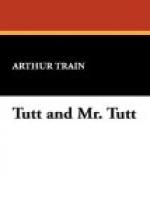As the old lawyer walked slowly home with his hands clasped behind his back he pondered upon the seeming mockery and injustice of the law that forced a lonely, half-demented old fellow with the fixed delusion that he was a financier behind prison bars and left free the sharp slick crook who had no bowels or mercies and would snatch away the widow’s mite and leave her and her consumptive daughter to die in the poorhouse. Yet such was the case, and there they all were! Could you blame people for being Bolsheviks? And yet old Doc Barrows was as far from a Bolshevik as anyone could well be.
Mr. Tutt passed a restless night, dreaming, when he slept at all, of mines from which poured myriads of pieces of yellow gold, of gushers spouting columns of blood-red oil hundreds of feet into the air, and of old-fashioned locomotives dragging picturesque trains of cars across bright green prairies studded with cacti in the shape of dollar signs. Old Doc Barrows was with him, and from time to time he would lean toward him and whisper “Listen, Mr. Tutt, I’ll tell you a secret! There’s a vein of gold runs right through my daughter’s cow pasture!”
When Willie next morning at half past eight reached the office he found the door already unlocked and Mr. Tutt busy at his desk, up to his elbows in a great mass of bonds and stock certificates.
“Gee!” he exclaimed to Miss Sondheim, the stenographer, when she made her appearance at a quarter past nine. “Just peek in the old man’s door if you want to feel rich! Say, he must ha’ struck pay dirt! I wonder if we’ll all get a raise?”
But all the securities on Mr. Tutt’s desk would not have justified even the modest advance of five dollars in Miss Sondheim’s salary, and their employer was merely sorting out and making an inventory of Doc Barrows’ imaginary wealth. By the time Mrs. Effingham arrived by appointment at ten o’clock he had them all arranged and labeled; and in a special bundle neatly tied with a piece of red tape were what on their face were securities worth upward of seventy thousand dollars. There were ten of the beautiful bonds of the Great Lakes and Canadian Southern Railroad Company with their miniature locomotives and fields of wheat, and ten equally lovely bits of engraving belonging to the long-since defunct Bluff Creek and Iowa Central, ten more superb lithographs issued by the Mohawk and Housatonic in 1867 and paid off in 1882, and a variety of gorgeous chromos of Indians and buffaloes, and of factories and steamships spouting clouds of soft-coal smoke; and on the top of all was a pile of the First Mortgage Gold Six Per Cent obligations of the Chicago Water Front and Terminal Company—all of them fresh and crisp, with that faintly acrid smell which though not agreeable to the nostrils nevertheless delights the banker’s soul.
“Ah! Good morning to you, Mrs. Effingham!” Mr. Tutt cried, waving her in when that lady was announced. “You are not the only millionaire, you see! In fact, I’ve stumbled into a few barrels of securities myself—only I didn’t pay anything for them.”




